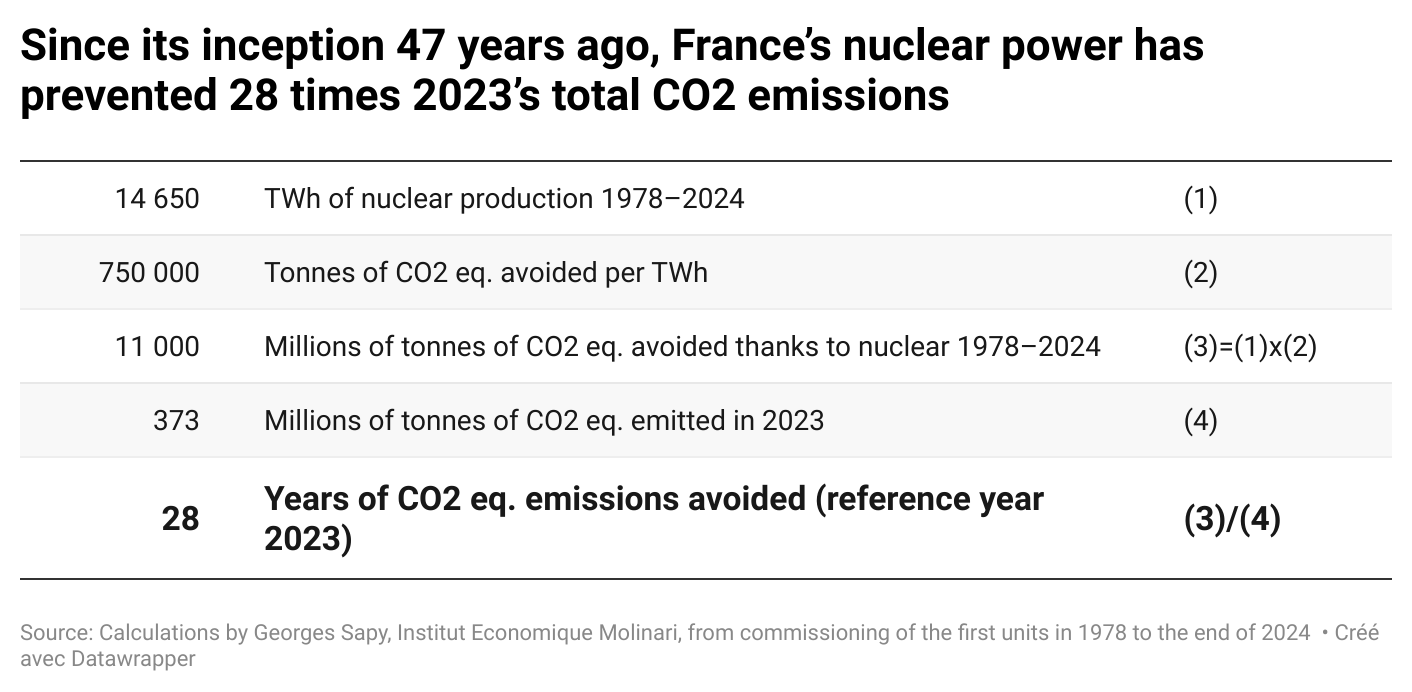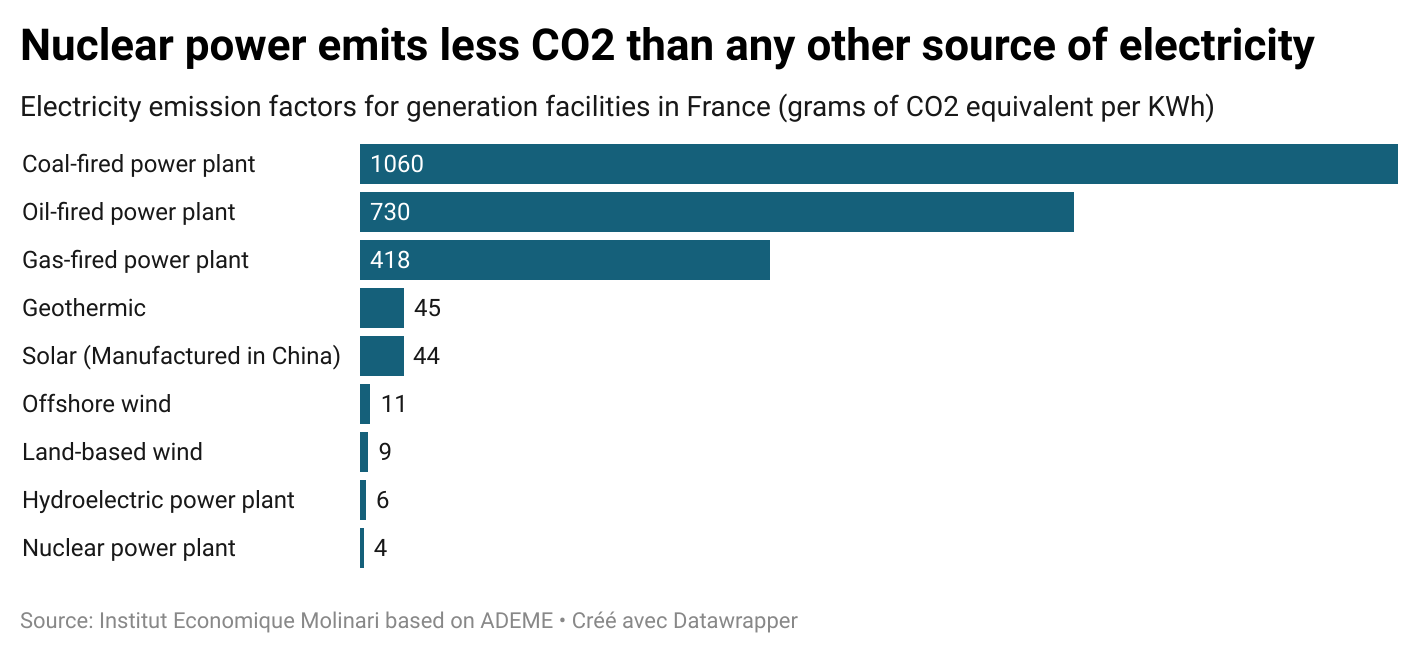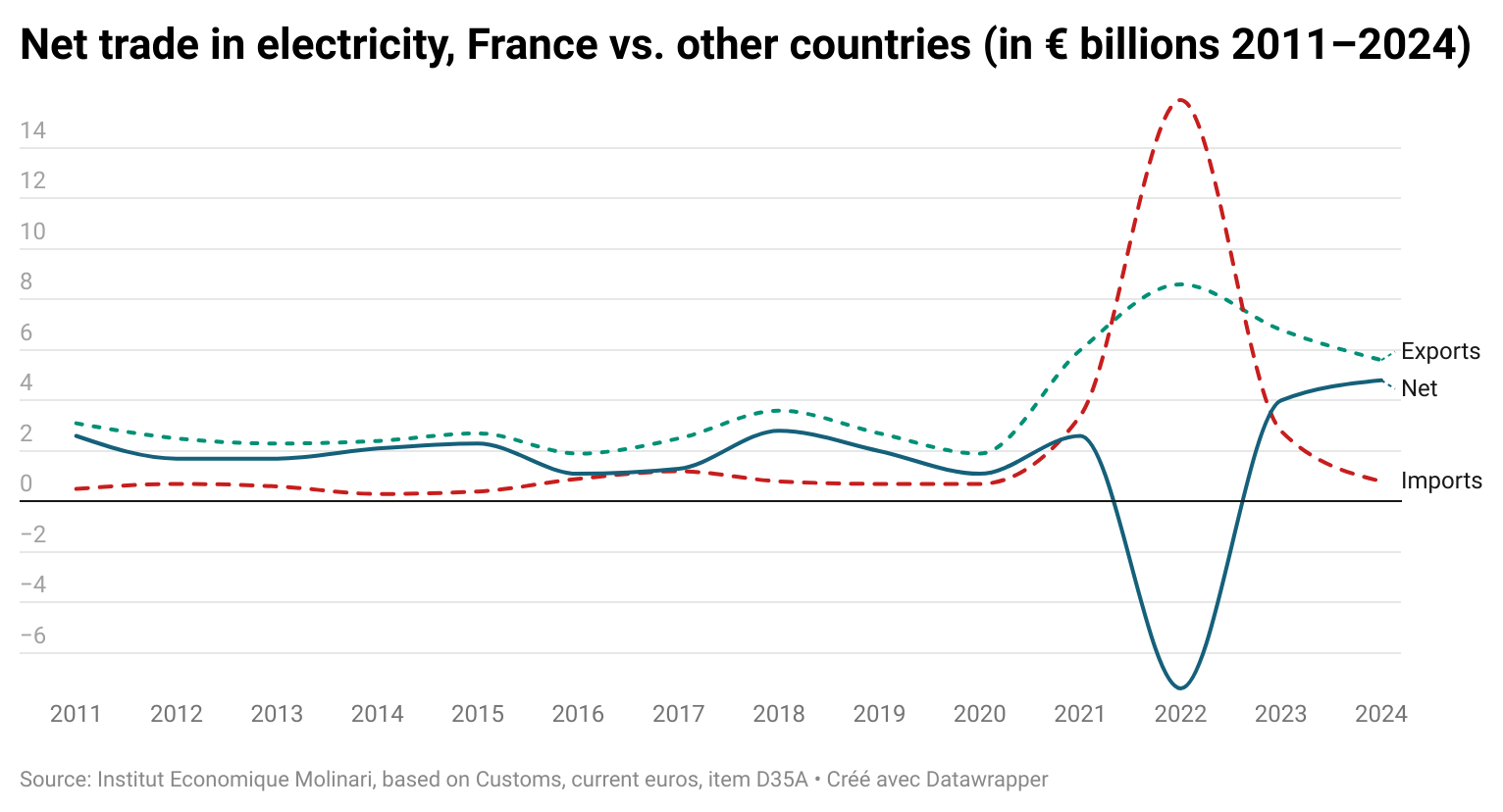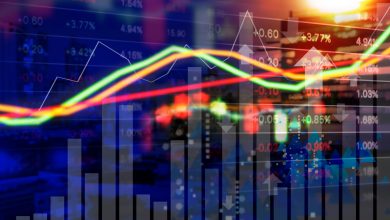Since its inception 47 years ago, France’s nuclear power has prevented 28 times 2023’s total CO2 emissions
Paris, March 6, 2025 – The Institut Economique Molinari is releasing a new estimate of the amount of CO2 production prevented by nuclear power. While crucial from an environmental point of view, the choice of nuclear power is also practical and economical. However, our highly uncertain political context risks forcing our long-term energy needs to take a back seat. Our leaders should maintain France’s historic reliance of nuclear power.
NUCLEAR ENERGY: A MAJOR FRENCH ASSET
An indispensable source of low-carbon energy:
- 28 year’s worth of 2023’s total CO2 emissions avoided in 47 years: the replacement of fossil fuels by nuclear power has avoided emission of about 28 times France’s total CO2 equivalent emissions of 2023;
- Nuclear energy emits the least CO2 per kWh produced: at only four grams of CO2 equivalent emissions per kWh (linked to the construction, maintenance and end-of-life dismantling of the power plant), nuclear power emits one quarter as much as wind power and one tenth as much as solar;
- Water requirements are not a critical issue: temporary shutdowns of certain reactors in summer, when electricity demand is low, are easily manageable. Outlook studies based on a global warming of 2°C show a limited increase in water-related outages on the order of 0.4% of annual production in recent years. Newer reactors, cooled by the atmosphere using wet air coolers, will consume very little water which will evaporate without heating up waterways.


High competitiveness and geopolitical independence of the country’s electricity production with respect to suppliers:
- Importation of fossil fuels avoided: with the exception of 2022, France has been Europe’s (and the world’s) leading electricity exporter for decades, with export revenues of between €1 billion and €5 billion, depending on the year;
- Significant stockpiles: imported uranium comes from a variety of countries, and France has significant stockpiles (30,000 tonnes, or four years’ production), as well as uranium from reprocessed spent fuel (four more years’ electricity production);
- Critical metals saved: unlike wind and solar power, nuclear power requires little in the way of critical metals per kWh produced. Shortages of these metals are a major risk.

Electricity production that can be managed even in very large quantities:
- Very small land footprint due to very high energy density: nuclear power requires just 0.03 hectares (ha) per megawatt (MW) installed. Solar requires about 80 times as much land, and onshore wind farms over 400 times as much. Nuclear saves on landscape, noise pollution and the degradation of nearby habitats;
- No additional costs associated with multiple grid connections, unlike intermittent sources, which require many additional connections;
- Predictable prices: nuclear power offers long-term price visibility, with uranium accounting for only around 5% of the cost of a kWh of electricity.
NUCLEAR ENERGY: THE RISK IS MOSTLY POLITICAL
- Nuclear waste is sorted and processed with the utmost rigour under the supervision of the French Authority for Nuclear Safety and Radiation Protection (ASNR). The most hazardous waste is melted down into special glass moulds before encapsulation in stainless steel containers. They are then stored 500 meters underground in rock that has not moved for several million years (Cigéo storage).
- In contrast, funding for the next six French EPR2 reactors has not yet been approved, and governmental instability is delaying the swift agreement required to launch the projects. A further layer of complexity exists at the European level where, despite significant progress, France’s historic nuclear facilities are still not considered “green.”
Three ways to liberate French nuclear power
- Extend life of current reactors by at least 60 years
The oldest of France’s reactors have just passed 40 years of operation and are far safer now than when they were new. They have been regularly refurbished, and their safety level has been improved every ten years to incorporate advances in knowledge and feedback from both French and international experience.
Most US reactors using the same technology have had their operating licenses extended to 60 years, and some even to 80 years, while others are currently under review.
These extensions are subject to review and approval by the ASNR, whose decision is final in terms of safety.
- Relaunch a new nuclear reactor program to increase the generating capacity required to meet the growing demand for low-carbon electricity in the future.
Unwavering long-term strategic political support is required, including an agreement to launch the first EPR2.
- Ratify the authorization of post-market measures for nuclear electricity from historical plants, enabling long-term price stabilization for consumers.
RESOURCES
The study, entitled “Why France must absolutely maintain its historical commitment to nuclear power,” is available (in French only) on our website: https://www.institutmolinari.org/wp-content/uploads/2025/02/etude-nucleaire-2025.pdf
Three Datawrapper infographics are available:
- Years of CO2 avoided thanks to French nuclear power: https://www.datawrapper.de/_/ghrv3/
- Nuclear power emits less CO2: https://www.datawrapper.de/_/IxLIc/
- Net trade in electricity: https://www.datawrapper.de/_/qPvDs/
ABOUT THE AUTHOR
Georges Sapy, trained as an Arts et Métiers engineer at Supélec, has spent his entire career with the EDF Group. After a few years in R&D, he worked on the engineering of large-scale power generation facilities, mainly nuclear, both in France and abroad (South Korea, China), as well as fossil-fuel power plants internationally. A member of the French Nuclear Society (SFEN), the Save the Climate (Sauvons le Climat) collective and PNC-France, he has been involved for many years with issues concerning the integration of variable and intermittent electricity into power systems.
He is the author of several books on nuclear energy and the energy revolution.
QUOTES
Georges Sapy, study author
“ ’Nuclear power is not something we do for pleasure, but out of necessity.’ This statement by Bernard Bigot, former High Commissioner for Atomic Energy, former General Administrator of the CEA, former Director General of ITER, and a great scientist, has never been more relevant. In the face of global warming, to refuse nuclear power would be to deprive ourselves of the most potent source of low-carbon energy known today, and to condemn ourselves to an energy shortage leading to degrowth.”
Cécile Philippe, President of the Institut Economique Molinari (IEM)
“Contrary to the concerns it sometimes arouses, nuclear risk is quite manageable. The benefits far outweigh the costs, with 28 times 2023’s CO2 emissions avoided since nuclear power came online in France. It’s crucial that we continue to invest in this sector, especially in a country that has first-rate experience in the field.”
Nicolas Marques, Director General of the Institut Economique Molinari (IEM)
“In Europe, financing nuclear power and the energy revolution in general is particularly complex due to the absence of long-term capital. The European Union suffers from a market capitalization deficit of €15.2 billion compared with the United States, linked to a shortfall in retirement savings of €17.3 billion by the end of 2022. This is a major handicap when it comes to financing energy transition and innovation in general. Just to relaunch the French nuclear industry, we’ll need to invest €80 billion, which will pay for itself in over 50 years.”
FOR MORE INFORMATION OR INTERVIEWS, PLEASE CONTACT:
Nicolas Marques, Director General of the Institut Economique Molinari
(Paris, French language)
nicolas@institutmolinari.org
+ 33 6 64 94 80 61
Or Cécile Philippe, President, Institut Economique Molinari
(Paris, Bruxelles, English or French language)
cecile@institutmolinari.org
+33 6 78 86 98 58
ABOUT THE IEM
The Institut Economique Molinari (IEM) is a research and educational organization whose mission is to promote individual freedom and responsibility. The Institute aims to facilitate change by stimulating debate around the conventional wisdom that generates the status quo. It aims to encourage the emergence of new consensus by proposing economic analysis of public policies, by illustrating the value of exchange, or by demonstrating the benefits of more lenient taxation and regulation. The IEM is a non-profit organization financed by the voluntary contributions of its members: individuals, companies or foundations. As an intellectually independent organization, it accepts no public funding.





